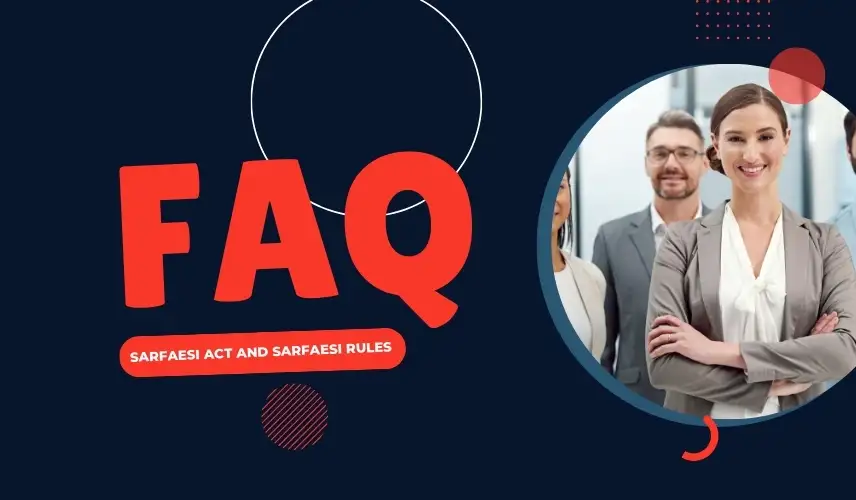
FAQ About Misc. Provisions of Sarfaesi Act, 2002
Answer: Supreme Court of India has held in a number of cases that a writ petition cannot be filed in the High Court against the steps and measures taken by the Secured Creditor in view of the fact that there is an alternative remedy under Section 17 of the Sarfaesi Act, 2002. Some of the judgements of the Supreme Court in this connection , are mentioned below :-
United Bank of India -versus- Satyawati Tandon reported in (2010)8 Supreme Court Cases page 110
Kanhaiyalal -versus- State of Maharastra reported in (2011)2 Supreme Court Cases page 782
Punjab National Bank -versus- Kut Energy (P) Ltd. reported in (2020)19 Supreme Court Cases page 541
Answer: In the case of Mardia Chemicals Ltd. –Versus- Union of India reported in (2004)4 Supreme Court Cases page 311, the Supreme Court held as follows:-
“To a very limited extent, jurisdiction of the civil court can also be invoked, where for example, the action of the secured creditor is alleged to be fraudulent or his claim may be so absurd and untenable which may not require any probe whatsoever or to say precisely to the extent the scope is permissible to bring an action in the civil court in the cases of English mortgages.”
However, practically a borrower is never allowed to file a suit on the ground of fraud holding that pleadings are not sufficient to establish fraud. In a number of cases, Supreme Court has not allowed filing of suit on the ground of fraud.
Jagdish Singh -versus- Heeralal reported in (2014)1 Supreme Court Cases page 479
Sree Anandakumar mills limited -versus- Indian overseas Bank reported in (2019)14 Supreme Court Cases page 788
Electrosteel Castings Limited -versus- U.V.Asset Reconstruction Co. Ltd. reported in (2022)2 Supreme Court Cases page 573
Categories
Related FAQs
-

FAQ About Essential Pre- Conditios for Taking Sarfaesi Action
Know more about frequently asked questions [...]
-

FAQ About Demand Notice Under Section 13(2) of Sarfaesi Act, 2002
Know more about frequently asked questions [...]
-

FAQ About Borrower’s Representation/ Objection Against Section 13(2) Notice
Know more about frequently asked questions [...]
-

FAQ About Non-performing Assets
Know more about frequently asked questions [...]
-

FAQ About Assignment of Loan Account to Asset Reconstruction Company
Know more about frequently asked questions [...]
-

FAQ About Possession of Immovable Property
Know more about frequently asked questions [...]
-

FAQ About Sale of Immovable Property Under Sarfaesi Act, 2002
Know more about frequently asked questions [...]
-

FAQ About Redemption
Know more about frequently asked questions [...]
-

FAQ About Possession and Sale of Movable Properties
Know more about frequently asked questions [...]
-

FAQ About Application to Debts Recovery Tribunal Under Section 17 of the Sarfaesi Act, 2002
Know more about frequently asked questions [...]
-

FAQ About Appeals to Debts Recovery Appellate Tribunal Including About Pre-deposit
Know more about frequently asked questions [...]
-

FAQ About Taking Possession With the Help of District Magistrate/Chief Metropolitan Magistrate Under Section 14 of the Sarfaesi Act, 2002
Know more about frequently asked questions [...]
-

FAQ About Eviction of Tenants Under Sarfaesi Act, 2002
Know more about frequently asked questions [...]
-

FAQ About Powers of Debts Recovery Tribunal
Know more about frequently asked questions [...]
-

FAQ About Powers of Debts Recovery Appellate Tribunal
Know more about frequently asked questions [...]
-

FAQ About Registration of Security Interest, That is Mortgage/hypothecation
Know more about frequently asked questions [...]
-

FAQ About Assets for Which Sarfaesi Action Can Not Be Taken Including Agricultural Land
Know more about frequently asked questions [...]
-

FAQ About Taking Over of Management
Know more about frequently asked questions [...]
-

FAQ About Misc. Provisions of Sarfaesi Act, 2002
Know more about frequently asked questions [...]
